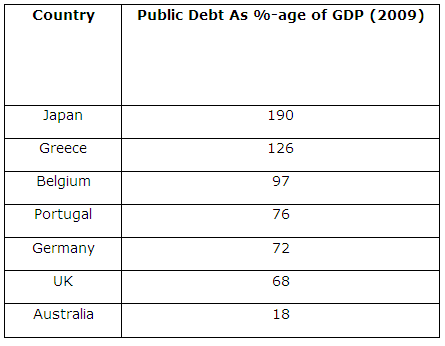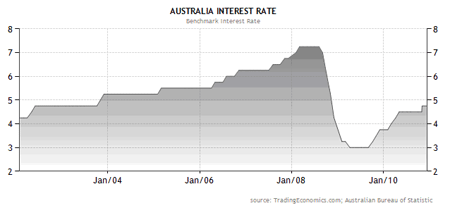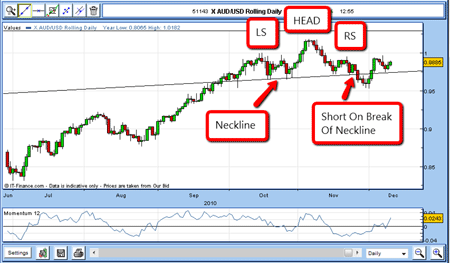Even the most promising looking trades can go wrong
Even when the conditions look ripe for a trade, things don't always pan out as expected. The important thing, says John Burford, is to make sure you minimise your losses.
Get the latest financial news, insights and expert analysis from our award-winning MoneyWeek team, to help you understand what really matters when it comes to your finances.
You are now subscribed
Your newsletter sign-up was successful
Want to add more newsletters?

Twice daily
MoneyWeek
Get the latest financial news, insights and expert analysis from our award-winning MoneyWeek team, to help you understand what really matters when it comes to your finances.

Four times a week
Look After My Bills
Sign up to our free money-saving newsletter, filled with the latest news and expert advice to help you find the best tips and deals for managing your bills. Start saving today!
The currency (foreign exchange) markets are full of interesting cross rates. Although it is possible to trade fairly exotic currencies against each other, I like to stay with trading a major currency against the US dollar. Why? Because the dollar is the world's reserve currency, and a whole slew of economic data that affects the market's view of the dollar is freely available.
So the task in trading a currency becomes one of making a judgment of the relative merits of the currency vis-a-vis the dollar. That should be easy, right?
The Australian economy looks good but is it in the price?
I recently spotted a great opportunity in the Australian dollar (AUS). We all know that Australia's economy is dominated by exports of natural resources such as coal, metals, and other commodities. Its trade with Asia (in particular, China) has been growing by leaps and bounds for years, with commodity prices being pushed up by this demand.
MoneyWeek
Subscribe to MoneyWeek today and get your first six magazine issues absolutely FREE

Sign up to Money Morning
Don't miss the latest investment and personal finances news, market analysis, plus money-saving tips with our free twice-daily newsletter
Don't miss the latest investment and personal finances news, market analysis, plus money-saving tips with our free twice-daily newsletter
Also, the background picture of the Australian economy is very favourable, compared with many other major economies.

Also, Australia has had a trade surplus since May this year (it had small deficits from May 2009 to April 2010). No sovereign debt worries there.
No wonder the AUS/USD has soared from the 0.60 area in early 2009 to the current level of parity a record high. The commodities bull market has been very good for the Aussie.
But, as parity has been reached, has the exchange rate discounted all of the "good" news out of Australia, and at the same time, discounted all the "bad" news out of the USA?
The 'Goldilocks' era has to end some time
In recent years, domestic Australian inflation has been troublesome (unemployment is low at around 5%, compared with the US on near-10%), and the Australian Central Bank has been forced to gradually raise short-term interest rates. This tends to pull even more investment in. Currently, the benchmark interest rate is at 4.75%, and rising.

As we all know, no "Goldilocks" situation lasts forever, and parity has been a major target for the bulls for some time. In November, the market managed to finally push through the magic 1.00 level and then fell back. Could that be the end of the bull market?
Betting against the Aussie
Because the bull market was very long in the tooth, and had hit a formidable resistance level, and the US dollar was showing signs of life, I decided to look for a sign of weakness. I believe I had it taped on 23 November.

Look at the above chart. The pattern that formed during October and November looked suspiciously like a textbook 'Head and Shoulders' pattern. This is a well-known formation that can be revealed at the end of a bull or a bear market. The 'Head' (marked on the chart above) is the top and the two 'shoulders' flank it. The key is that the dips in between should lie on a straight line and in the above case, they do! This is called the 'Neckline', and any break below it is considered bearish and a likely precursor to a big fall.
With great expectation, I placed a sell order just below the line at the round number 0.9700 and was filled on 26 November.
Nov 26: Sell £2 Rolling AUS/USD @ 0.9700. Risk 75 pips - £150 (3% of account)
Following my 3% Rule, I placed my protective stop 75 pips away.
The market stayed beneath the Neckline over the next few days, but really did not make much progress. I decided to move my stop down closer to the Neckline at 0.9725 to reduce my risk. I was willing to give it a little room in case the market made a small spike above my Neckline. But the lack of downward progress was worrying and there was a potential Positive Divergence with Momentum.

Then, on 2 December, the market rallied strongly right through my protective stop. That wasn't supposed to happen! The Head and Shoulders pattern looked textbook; the US dollar was gaining more friends; and the AUS/USD bull market looked tired.
Dec 2: Buy £2 Rolling AUS/USD @ .9725. Loss £50
But this is a great example of a case where I had most of my ducks lined up, but my aim was off. Back to the drawing board! It's also an important reminder even when all the signals look perfect for a trade, things aren't always going to go your way. Every trader will make losing trades that's just part of the life of a trader. That's why maintaining constant discipline when it comes to money management is so important. Some losses are inevitable but if you maintain your discipline, you can keep them small, so that you live to fight another day.
Get the latest financial news, insights and expert analysis from our award-winning MoneyWeek team, to help you understand what really matters when it comes to your finances.
John is is a British-born lapsed PhD physicist, who previously worked for Nasa on the Mars exploration team. He is a former commodity trading advisor with the US Commodities Futures Trading Commission, and worked in a boutique futures house in California in the 1980s.
He was a partner in one of the first futures newsletter advisory services, based in Washington DC, specialising in pork bellies and currencies. John is primarily a chart-reading trader, having cut his trading teeth in the days before PCs.
As well as his work in the financial world, he has launched, run and sold several 'real' businesses producing 'real' products.
-
 Last chance to invest in VCTs? Here's what you need to know
Last chance to invest in VCTs? Here's what you need to knowInvestors have pumped millions more into Venture Capital Trusts (VCTS) so far this tax year, but time is running out to take advantage of tax perks from them.
-
 ISA quiz: How much do you know about the tax wrapper?
ISA quiz: How much do you know about the tax wrapper?Quiz One of the most efficient ways to keep your savings or investments free from tax is by putting them in an Individual Savings Account (ISA). How much do you know about ISAs?